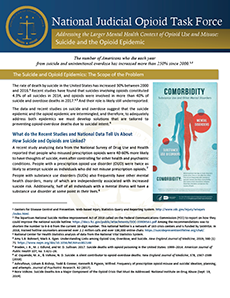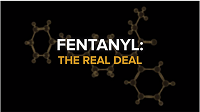Finding Solutions to the Prescription Opioid and Heroin Crisis: A Road Map for States (National Governors Association)
State Opioid Task Forces and Emergency Declarations (4/2018, National Center for State Courts)
Regional Judicial Opioid Task Force (National Center for State Courts)
Developing Effective Coalitions: An Eight Step Guide (1/2002, Prevention Institute)
Section 5. Coalition Building I: Starting A Coalition (University of Kansas, Community Toolbox)
What Google Learned from its Quest to Build the Perfect Team (2/2016, New York Times)
Ten principles of good interdisciplinary team work. (5/2013, Human Resources for Health)
Confidentiality, Information Sharing, and Data
Public Policy Statement on Prescription Drug Monitoring Programs (PDMPs) (4/2018, American Society of Addiction Medicine)
Disclosure of Substance Abuse Records with Patient Consent: 50 State Comparison (The George Washington University’s Hirsh Health Law and Policy Program and the Robert Wood Johnson Foundation, Health Information and the Law)
The Opioid Crisis in America & the Role Medical-Legal Partnership Can Play in Recovery (3/2018, National Center for Medical Legal Partnership)
ODMap-Harnessing the Power of Data to Tackle Our Nation's Opioid Public Health Emergency (2018, BJA and HIDTA)
Rx Pain Medications, Know the Options, Get the Facts: Prescription Drug Monitoring Programs (PDMPs) (11/2017, SAMHSA): One-page handout that would be good to distribute to the public at applicable events.
SAMHSA Issues Final Rule on the Confidentiality of Alcohol and Drug Treatment Information (1/2017, Legal Action Center)
In Brief: Prescription Drug Monitoring Programs: A Guide for Healthcare Providers (12/2016, SAMHSA): Useful in getting healthcare providers to cooperate with PDMPs.
A Note on HIPAA and 42 CFR Part 2: Dispelling the Myths about Justice-Health Information Sharing(11/2014, National Governor's Association)
Corrections and Reentry: Protected Health Information Privacy Framework for Information Sharing (2014, American Probation and Parole Association)
Information Sharing in Criminal Justice - Mental Health Collaborations: Working with HIPAA and Other Privacy Laws (2010, BJA and the Council of State Governments Justice Center)
Law Enforcement
Ten Standards of Care: Policing and the Opioid Crisis (2018, Police Executive Research Forum)
Fentanyl Safety Recommendations for First Responders (8/2018, Federal Interagency Working Group)
The Unprecedented Opioid Epidemic: As Overdoses Become a Leading Cause of Death, Police, Sheriffs, and Health Agencies Must Step Up Their Response (9/2017, Police Executive Research Forum)
Medical Providers
Buprenorphine Waiver Management (5/2019, SAMHSA)
DEA Requirements for DATA Waived Physicians (DWPs) (U.S. Department of Justice, Drug Enforcement Administration)
Public Policy Statement on Office-based Opioid Agonist Treatment (OBOT) (American Society of Addiction Medicine)
Medications to Treat Opioid Use Disorder: How is opioid use disorder treated in the criminal justice system? (6/2018, National Institute on Drug Abuse): Useful to start a discussion on the current state of treatment.
Criminal Justice Coordinating Council Members: Tips for Supporting the Local Behavioral Health Service Continuum - Judges (1/2018, SAMHSA)
Disclosure of Substance Use Disorder Patient Records: Does Part 2 Apply to Me? (2017, Substance Abuse and Mental Health Services Administration - SAMHSA): Useful to treatment providers.
Disclosure of Substance Use Disorder Patient Records: How Do I Exchange Part 2 Data? (2017, SAMHSA): Useful to treatment providers.
Confidentiality of Substance Use Disorder Patient Records (1/2017, Health and Human Services Department)
Justice System Use of Prescription Drug Monitoring Programs (1/2015, Bureau of Justice Assistance - BJA): Comprehensive overview of PDMPs that can be used to teach and to help advocate if needed.

